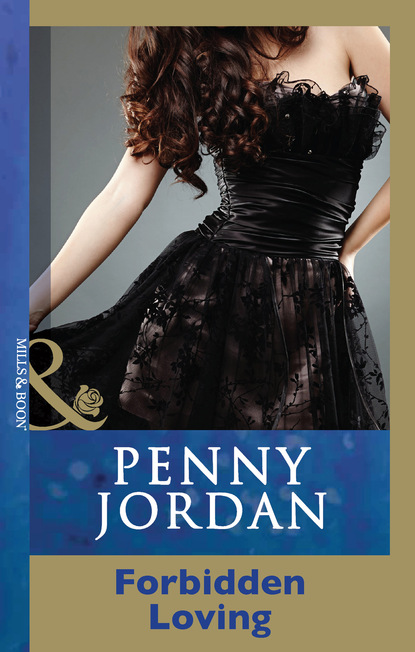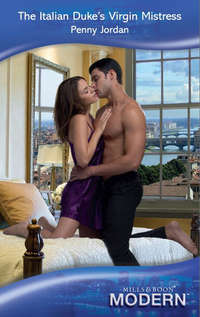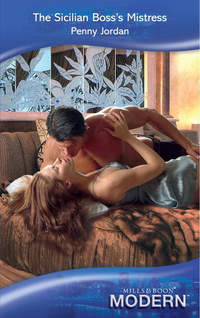
Полная версия
Dangerous Interloper


Dangerous Interloper
Penny Jordan

www.millsandboon.co.uk
MILLS & BOON
Before you start reading, why not sign up?
Thank you for downloading this Mills & Boon book. If you want to hear about exclusive discounts, special offers and competitions, sign up to our email newsletter today!
SIGN ME UP!
Or simply visit
signup.millsandboon.co.uk
Mills & Boon emails are completely free to receive and you can unsubscribe at any time via the link in any email we send you.
Table of Contents
Cover
Title Page
CHAPTER ONE
CHAPTER TWO
CHAPTER THREE
CHAPTER FOUR
CHAPTER FIVE
CHAPTER SIX
CHAPTER SEVEN
CHAPTER EIGHT
CHAPTER NINE
Copyright
CHAPTER ONE
MIRANDA SHEPHERD paused on the pavement, staring up through the scaffolding at the building in front of her. Her heart sank. So it had started, then. What had once been an admittedly shabby but untouched Georgian town house had now fallen victim to the developers’ greedy and uncaring hands.
It had been happening so often lately, especially since their quiet country town had become so easily accessible to London.
Whereas once shoppers had clustered happily and untidily around the small market square and its surrounding warren of narrow cobbled streets, they were now abandoning these old-fashioned local shops for the new hypermarket and enclosed shopping centre which had recently been constructed on the edge of the town, leaving its once thriving centre empty.
As the leases had fallen due for renewal they had been bought up, and slowly, one by one, the shabby Georgian town houses were being redeveloped and sold off to the new breed of businesses taking over the centre of the town; building societies, banks, estate agencies like her father’s, and offices.
This building had been a particular favourite of Miranda’s and to see it fall into the hands of what she privately considered to be one of the town’s least sympathetic and most greedy builders had saddened and outraged her. She wasn’t alone in her resentment and anger either, even though her father might gently point out that people had to make a living and that the rash of newcomers and new businesses to the area was also bringing with it new jobs. A conservation group had sprung up to protect what was left of the town’s heritage, although in the case of this particular house it was already too late.
The building had, she learned from her father, been sold to another newcomer; a businessman from London who wanted to base his computer-software business in the town.
She shuddered inwardly, able to imagine all too easily how the house would look when it was finished, stripped of its faded elegance and ‘improved’ to meet the demands of its new owner.
As she was staring sadly at the yawning windows, now minus their elegant sash frames, she was hailed by a man coming out of the front door.
‘Well, if it isn’t Miranda, and looking as stunning as ever … Looking for me, were you, my lovely? I’m just about to knock off. Fancy coming and having a bite of lunch with me?’ Miranda froze, cursing her own folly in stopping. She might have known that, with her luck, Ralph Charlesworth would be here. It was his building firm which was doing the renovations, and that on its own would have been sufficient to ensure that she was not well-disposed towards him; but added to that was the fact that he was a swaggering, unpleasantly arrogant man, who at thirty-five with a wife and three small children still seemed to think he was free to behave as though they simply did not exist.
For some reason he was at present insisting on pursuing Miranda, although she had made it more than plain to him that she was not only not interested, but she found his heavy-handed flirtatiousness offensive and unwelcome. Even if he had not been married, she would not have found him attractive, either physically or mentally.
He was a big man, rather overweight, with small, rather unpleasantly close-set eyes and a manner of looking at her that made her skin crawl.
Now, as she inwardly cursed the misfortune which had made her stop to look at the house just as he happened to be emerging from it, she told him coldly, ‘No, as a matter of fact I wasn’t looking for you.’
‘No?’
The disbelieving leer he gave her made her face flush with renewed anger.
In her view it was unfortunate that, through her job as a very junior partner in her father’s estate agency business, she was obliged in certain circumstances to come into contact with Ralph.
On these occasions she was always icily and coldly formal with him, making sure she never gave him any reason to believe she was anything other than repulsed by his apparent interest in her.
Her father had sympathetically offered to make sure she came into as little contact with the builder as possible, but she had shaken her head determinedly. After all, she couldn’t hide behind her father’s protection all her life. Ralph Charlesworth and men like him were just one of the more unpleasant aspects of her chosen career.
She was a tall woman, but very slenderly built, with fragile-looking bones, and a delicately heart-shaped face framed by a soft straight bob of silky black hair.
In her own view her eyes were her best feature, being almond shaped and wide apart, and a colour which varied from blue to lavender, depending on her mood.
Right now they were the colour of the storm clouds which lined the horizon on blustery days, tinged almost purple with the weight of her anger and dislike.
Up above her on the scaffolding she could hear some of Ralph’s men calling out jocular comments to him. No doubt his men didn’t mean to be personally offensive to her, she reflected bitterly as she turned away from the building; no doubt, working as they did for a man like Ralph, they took their cue from him and perhaps thought it flattering to call out personal and often offensively personal remarks to any woman foolish or unwary enough to walk past them. She personally found such behaviour unwarranted and unpleasant.
‘Aw, come on … With a figure like yours, you can’t need to worry about calories,’ Ralph leered, openly letting his gaze slide lasciviously over her body.
To her humiliation, Miranda felt her face flushing as guiltily as though she had in some way invited the intrusiveness of his sexual appraisal of her.
Surely her neat pleated skirt, with its complementary tailored jacket over a crisp white blouse, could never be even remotely described as provocative, and as for her manner … she was sure that at no time had she ever given Ralph Charlesworth the slightest reason to believe that she even liked him, never mind …
All too conscious of the attention she was drawing from the watching men above her, Miranda decided there was no point in allowing herself to be drawn into any further change of conversation, so she turned on her heel and walked angrily away, her mind seething with anger and resentment as she turned the corner and headed for the town square.
As she rounded the corner the wind caught her hair, whipping it across her eyes, momentarily blinding her so that she didn’t see the man coming towards her until it was too late and she had walked right into him.
‘Hey, are you all right?’
‘All right …’ The words reverberated dizzily somewhere deep within her, causing the most odd sensations inside her. Or was it the firm pressure of those male arms, the proximity of that hard male chest which rose and fell so … so steadily and somehow comfortingly against her own that was causing her to experience this odd light-headedness?
Shakily she fought to control her peculiar responses, pushing herself away from the warmth of his body, and drawing herself up to her full height as she forced herself to at least try to look businesslike and cool.
‘Yes … yes … I’m fine … so silly of me … I wasn’t looking where I was going.’
She looked at him as she spoke and suffered such a shock of sensation through her entire body that it was as though she had suddenly become completely paralysed.
She was a tall girl, but this man … was taller—six feet two at least. He had broad shoulders, very broad shoulders, she acknowledged weakly as she discovered she was still staring at him.
‘Oh, is that what it was?’ His voice was warm and deep, and laced with something that suggested that he had a good sense of humour. ‘I rather had the impression you were trying to escape from something or someone.’
She couldn’t help it; Miranda knew that her eyes were widening automatically in reaction to his perceptiveness. Instinctively she looked up into his eyes, and then immediately wished she hadn’t. They were warm and grey, and fringed with thick dark lashes. She couldn’t remember the last time a man, any man, had had such an intense physical impact on her. Come on, she warned herself, you’re twenty-eight, not eighteen. You do not walk into a stranger and then stand staring at him as dumbstruck as though you’ve fallen head over heels in love with him, even if he does come packaged six feet-odd, grey eyed, dark-haired and with the most devastating smile you’ve ever seen.
It’s the inner person who matters, not his outward physical appearance, she told herself severely as she tried to pull herself together, and realised that he was still smiling at her as though waiting for a response to his comment.
The very idea of explaining to him about Ralph Charlesworth was far too impossible even to be contemplated and so instead she launched into a breathless rush of semi-truths, explaining to him that it was the sight of the desecration of what had once been a wonderful example of small-town Georgian architecture that had sent her scurrying round the corner without paying attention to what she was doing.
‘Still, I suppose this computer genius who’s bought the place doesn’t know how important it is to preserve buildings like this one; nor if he did, would he care.’
As she came to a breathless full stop, his eyebrows arched. ‘That’s a rather biased criticism, isn’t it?’ he suggested mildly.
Miranda felt her face flush uncomfortably, aware that she had probably sounded more overheated than their very brief acquaintance warranted.
She also realised several other things as well: namely that she was deliberately if unconsciously delaying taking her leave of him; that she could have quite easily stood for hours here on the pavement looking at him; that she was going to be late arriving back at the office; that she was in fact behaving like a complete fool, and should have simply thanked him and apologised to him for bumping into him in a crisp businesslike manner and gone on her way.
‘I … I must go,’ she told him quickly. ‘I’m sorry I delayed you …’
She hesitated, half hoping he would make some kind of gallant comment about it being a pleasure to be delayed by her, and half relieved when he didn’t. If there was one thing that ordinarily she detested, it was heavy-handed compliments, and yet to know that this particular man had found her company pleasurable …
Angry with herself, she stepped hurriedly past him, walking quickly into the square and then across it.
Their office was on the other side of the square in a pretty Queen Anne town house, which her father had bought when he’d originally set up his practice in the town.
She didn’t allow herself to look back, but that didn’t stop her thoughts from wondering busily who he was. Ruefully she told herself that he was very probably married with a family, chiding herself for her interest in him. She hadn’t seen him around before, but that didn’t mean anything. The town was growing, mushrooming almost, and whereas when she’d first joined her father in his estate agency business as his junior partner she could hardly walk across the town square without stopping to acknowledge the greetings of almost everyone she passed, now the opposite was true.
Liz, their receptionist, gave her a sunny smile when she walked in.
‘Dad’s in his office, is he?’ she asked her.
‘Yes. He’s going out in half an hour, though, to show some clients round Frenshaw’s farm.’
Thanking her, Miranda walked through the pleasant, comfortable reception area and into the passage beyond it. Three doors led off the passage, one to her father’s office, one to her own, and one that they used as a general filing and storage space.
As she rapped briefly on her father’s office door before walking in, she found herself thinking about the man again, wondering who he was and where he had been going.
Stop it, she told herself severely. She was a woman of twenty-eight, who had firmly and deliberately avoided what she considered to be the pit-falls of falling in love and committing herself to the kind of marriage she had seen overwhelm so many of her friends.
Maybe in the large cities things were different, but here in this country town—and, she suspected, in others like it—a woman was still expected to be the mainstay of the family in the traditional way.
Oh, perhaps these days a woman had a job as well, but, from what Miranda could see of her friends’ lives, this made things harder for them and not easier. It might give them some financial independence, but in return for that they had to suffer losing the independence of having time to themselves, and to shoulder an extra burden of guilt, especially when they had children.
Most of her friends had married in their early twenties, when the last thing she had wanted had been the constraints of having to put another person’s desires and needs before her own. She liked being free to make her own decisions about how she should spend her life and her time. She knew that in the eyes of many of her friends she was well and truly established as a bachelor girl and a career woman, and originally this hadn’t bothered her, but lately she had begun to undergo some kind of sea change; a totally unexpected sea change, it had to be admitted.
For the first time, she had recently picked up a friend’s new baby, expecting to experience her normal lack of interest but ready to make all the appropriate noises to satisfy the new mother’s pride, and had instead experienced the most peculiar sense of completeness, of wanting to go on holding the small warm body; so much so that when she had handed the baby back to its mother she had actually felt a tiny ache of loss.
She had quickly put the experience behind her, telling herself that it was simply a momentary aberration; something hormonal that was unlikely to happen again. Only she had been wrong.
She hoped she was far too sensible to mistake this unfamiliar yearning for a mate and his offspring for anything other than a probable reaction to too much not-so-subtle pressure from the media to conform to the image of the modern woman, who, according to them, in order to be fulfilled must ‘have it all’. Certainly she had already ruefully decided that the chances of her finding a man with whom she might want to actually spend the rest of her life locally were very small indeed.
She had a large circle of friends, enjoyed their company, both male and female, but none of the men she knew had ever aroused anything more than a mild degree of friendship within her. At least until today …
‘Ah, there you are,’ her father greeted her as she walked into his office. ‘You haven’t forgotten about tonight, have you?’
‘Tonight?’
‘Yes, the dinner dance at the golf club. I told you about it,’ he reminded her. ‘I’ve invited Ben Frobisher, the man who bought the house in the High Street.’
‘The computer man?’ Miranda asked grimly. ‘Oh, you know how I feel about what’s happening to the town … to its buildings. I walked past there this morning. Ralph Charlesworth’s got the contract for the work.’ Her face hardened a little. ‘That building ought to have been listed. We’ve been in touch with the Georgian Society and they confirmed—’
‘Look, Miranda, I know how you feel,’ her father interrupted her patiently, ‘but this man’s an important client. He’ll have employees who will be wanting to relocate in the area. He himself is looking for a house. He’s renting the Elshaw place at the moment.’
‘If he’s as high-profile as you say, I can’t understand why he should want to attend the annual golf club hop,’ Miranda told her father drily.
‘I expect he wants to get to know people. After all, he is going to be a part of the community.’
‘Is he? From what I’ve seen, most of the people who’ve moved down here seem to prefer to form their own small smart cliques rather than try to integrate with the locals. Look at what’s happened at the tennis club.
‘This time last year we had four tatty courts that were only used in the summer and a club-house that was falling down; now, thanks to a small high-pressure group of London wives, we’ve got a building fund going and ambitious plans to build two indoor courts, plus all the facilities of an expensive London gym, complete with swimming pool, bar, and everything that goes with it.’
‘So? What’s wrong with that?’
‘Dad, don’t you see? It’s spoiling the character of the place. Another few years and we’ll just be another dormitory town. The locals won’t be able to afford to live here any more, and during the week it will be a town of too rich, too bored women vying with one another.
‘There won’t be any real life to the town; it will be completely sanitised. There’ll be no children—they’ll all be away at boarding school. There won’t be any old people—they’ll all be packed off to exclusive residential homes.’
‘If that means that we’ll no longer have a dozen or more surly-looking youths hanging round the town square all night, then personally I think it would be a good thing.’
‘But, Dad, those kids belong here, and they’re not surly. They’re just … just young,’ Miranda told him helplessly. One of her extramural activities which gave her the most satisfaction was her work with a local youth club. ‘They need an outlet for their energy, that’s all,’ she told her father. ‘And they won’t find it in some expensive exclusive tennis club.’
He laughed, shook his head and smiled ruefully at her.
‘I think you’re over-reacting a little, Miranda. Don’t forget that people like Ben Frobisher are bringing new life to the area, new jobs … new opportunities.’
‘New architecture,’ Miranda murmured under her breath, unable to resist.
Her father looked at her. ‘You don’t know what he intends to do with that house. He struck me as an eminently sensible man. I’m sure that he—’
‘Sensible? And yet he still employed Ralph Charlesworth?’
Her father sighed. ‘All right. I know you don’t like Ralph Charlesworth; admittedly he isn’t the most prepossessing of men, but he does have a good reputation as a builder. He’s tough and he sticks to his contracts.’
Miranda shook her head, knowing that this was a subject on which she and her father would never agree That was what made her job so enjoyable, though: the fact that they were so different … had views which were sometimes so conflicting. Her father admitted that since she had joined the firm their business had improved dramatically, and equally she was the first to concede that without her father’s experience, his ‘know-how’, his tolerance, she would never have been able to branch out into testing ideas which were innovative and new.
They made a good team, she recognised as she smiled at him.
‘Don’t forget,’ he warned her, ‘about tonight; I’ve arranged for Frobisher to meet us at home, and we’ll all set off from there. It will make things easier.’
‘What time do you want me there?’ Miranda asked him, giving in. She didn’t live with her father, but had her own small cottage several miles outside the town.
‘Half-past seven,’ he told her. ‘Helen is arriving at seven.’
Helen Johnson was a widow some five years younger than her father. They had become engaged at Christmas … and were getting married at the end of the month. They were then going on a month’s cruise, leaving Miranda in sole charge of the business.
She liked Helen and was pleased that her father was remarrying. Her mother had always had a weak heart, and after a long period of illness had died several days after Miranda’s twelfth birthday.
Miranda had missed her desperately; had gone through anguish, anger, fear and despair, had hated both her mother for leaving her and her father for letting her, but eventually she had begun to recover, and by the time she was in her late teens had become mature enough to understand that if she missed her mother so desperately then her father must feel even more alone.
She had been twenty-one when her father had offered her her partnership in the business, and it was then that she had decided to find her own home, as much for her father’s sake as her own. He was an attractive man, still only in his mid fifties, and, although he never seemed to be interested in any of the women who pursued him, Miranda had felt that it was only fair to him not to burden him with a live-in grown-up daughter.
He had met Helen three years ago, when she had come into their offices to ask their advice on selling her large house following the death of her husband. What she wanted was to stay in the area, but in something rather smaller, she had told them.
It had originally been Miranda who had dealt with her, and who had convinced her to buy a very pretty Georgian house on the outskirts of the town, convenient for everything, and yet still quiet, with a pleasant garden and pretty views over the river and the surrounding countryside.
Now she and Miranda’s father were getting married and Miranda was delighted for both of them.
What did not delight her quite so much was the fact that Ralph Charlesworth’s wife was Helen’s niece.
Not that she had anything against Susan Charlesworth. In fact she considered her a very pleasant, if somewhat introverted woman. What she did not like was the fact that as Helen’s niece she would be attending the wedding. Which meant that her husband would also be attending the wedding … which meant that she, Miranda, would be forced to endure his company for a number of hours and to be pleasant to him in the interests of family harmony, and yet at the same time reinforce to him her complete rejection of him as a man.
She had no idea why he had decided to make her the object of his pursuit. She had certainly given him no encouragement to do so. She found him detestable and felt thoroughly sorry for Susan Charlesworth. The next time she found herself going all maternal and gooey-eyed over someone’s baby, she might try reminding herself of how much she would loathe being married to a man like Ralph Charlesworth, she told herself wryly as she settled down to work.
She worked steadily all afternoon, reflecting that the influx of people into the area had certainly brought a dramatic increase in the firm’s business, and that if things kept on the way they were going her father would have to consider taking on another partner.
At half-past five her father himself rapped on her office door and opened it.
‘Don’t forget about tonight, will you?’ he asked her.
‘No. I promise I’ll be there.’
Just as he was about to leave she asked, ‘Doesn’t this Ben Frobisher have a wife? He’s in his thirties, isn’t he?’










